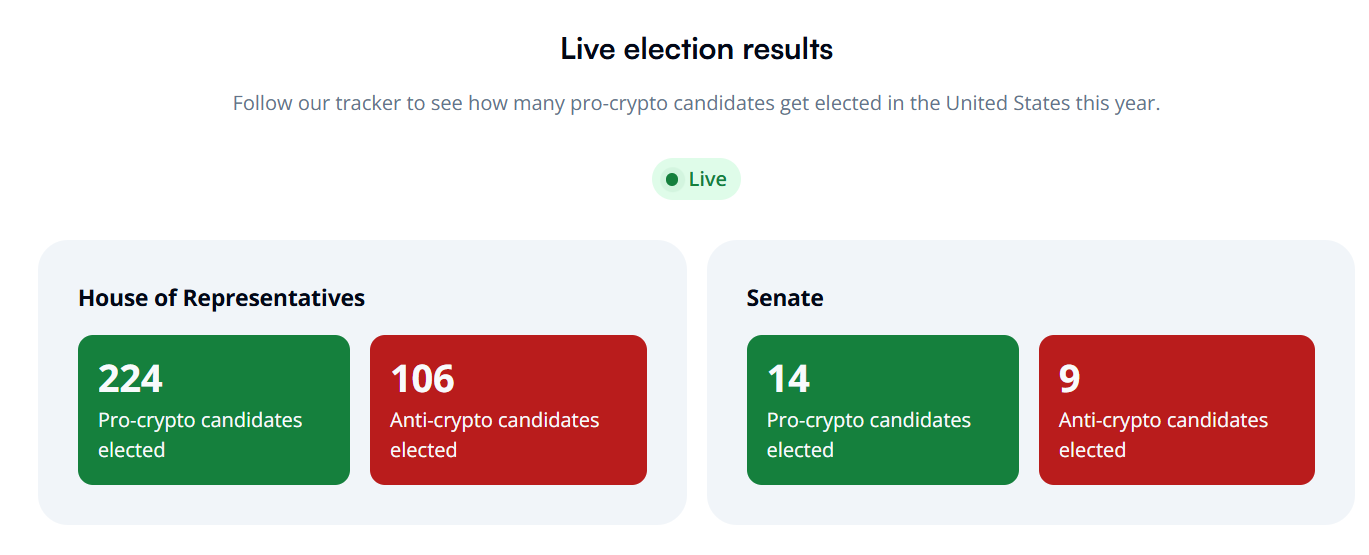The ongoing November 2024 U.S. elections have proven to be a turning point for the crypto industry, as pro-crypto candidates lead in Congress.
This development has triggered optimism among crypto leaders, including Coinbase CEO Brian Armstrong. In a recent X post, Armstrong stressed the importance of the elections.
At present, pro-crypto candidates are outperforming their opponents in Congress. Data from the crypto-focused political action committee (PAC) Stand With Crypto reveals that 238 candidates supporting crypto currently lead in the elections, with 224 in the House of Representatives and 14 in the Senate.

In contrast, anti-crypto candidates hold a smaller share, with 115 leading positions, including 106 in the House and 9 in the Senate. Notably, these numbers suggest that crypto-friendly policies may soon gain more traction in Congress.
Coinbase CEO Reacts
Armstrong spotlighted these results, calling this Congress “America’s most pro-crypto” and highlighting the strong stance of American voters in favor of clear regulations for digital assets.
He noted that voters across party lines showed strong support for the industry, indicating that both Republicans and Democrats increasingly recognize the potential of the crypto market.
Armstrong also thanked supporters for rallying behind the crypto industry and highlighted his readiness to work with the new Congress on fostering clear, growth-oriented guidelines.
Crypto enthusiasts see the forthcoming favorable Congress as an opportunity to curb years of enforcement actions and regulatory ambiguity that have hindered the sector’s development.
The crypto market has responded positively to these developments, with Bitcoin reaching a new all-time high above the $75,000 earlier today amid the promising election results, primarily led by Donald Trump’s lead in the presidential race.
Pro-Crypto Candidates Lead in US Congress
In Ohio’s Senate race, Bernie Moreno, a Republican who has voiced strong support for crypto, secured victory with 45.83% of the vote.
However, in a disappointing twist for the community, notable anti-crypto candidate Elizabeth Warren won the Massachusetts Senate race with 37.08%, defeating John Deaton, a lawyer known for defending XRP holders in the Ripple vs. SEC case.
In Iowa’s 3rd Congressional District, Zach Nunn, another pro-crypto Republican, clinched a win with 50.78%. In Maryland’s Senate race, Democrat Angela Alsobrooks, who has shown moderate support for the crypto industry, also won her seat.
Meanwhile, Republican candidates Eric Hovde in Wisconsin and Mike Rogers in Michigan are leading in their respective Senate races, with Hovde receiving 44.62% and Rogers holding a 37.59% lead.
Presidential Race
At the same time, the presidential race is also looking bullish for the crypto scene. With Republican candidate Donald Trump leading the election at 247 electoral votes compared to 214 for Democrat Kamala Harris, there is growing anticipation that a pro-crypto administration could emerge.
A Trump victory is expected to reinforce the congressional gains, as most Republicans generally support cryptocurrency adoption. Should the pro-crypto candidates prevail, most expect the industry to benefit from a supportive legislative environment for the next four years.
The ongoing November 2024 U.S. elections have proven to be a turning point for the crypto industry, as pro-crypto candidates lead in Congress.
This development has triggered optimism among crypto leaders, including Coinbase CEO Brian Armstrong. In a recent X post, Armstrong stressed the importance of the elections.
At present, pro-crypto candidates are outperforming their opponents in Congress. Data from the crypto-focused political action committee (PAC) Stand With Crypto reveals that 238 candidates supporting crypto currently lead in the elections, with 224 in the House of Representatives and 14 in the Senate.

In contrast, anti-crypto candidates hold a smaller share, with 115 leading positions, including 106 in the House and 9 in the Senate. Notably, these numbers suggest that crypto-friendly policies may soon gain more traction in Congress.
Coinbase CEO Reacts
Armstrong spotlighted these results, calling this Congress “America’s most pro-crypto” and highlighting the strong stance of American voters in favor of clear regulations for digital assets.
He noted that voters across party lines showed strong support for the industry, indicating that both Republicans and Democrats increasingly recognize the potential of the crypto market.
Armstrong also thanked supporters for rallying behind the crypto industry and highlighted his readiness to work with the new Congress on fostering clear, growth-oriented guidelines.
Crypto enthusiasts see the forthcoming favorable Congress as an opportunity to curb years of enforcement actions and regulatory ambiguity that have hindered the sector’s development.
The crypto market has responded positively to these developments, with Bitcoin reaching a new all-time high above the $75,000 earlier today amid the promising election results, primarily led by Donald Trump’s lead in the presidential race.
Pro-Crypto Candidates Lead in US Congress
In Ohio’s Senate race, Bernie Moreno, a Republican who has voiced strong support for crypto, secured victory with 45.83% of the vote.
However, in a disappointing twist for the community, notable anti-crypto candidate Elizabeth Warren won the Massachusetts Senate race with 37.08%, defeating John Deaton, a lawyer known for defending XRP holders in the Ripple vs. SEC case.
In Iowa’s 3rd Congressional District, Zach Nunn, another pro-crypto Republican, clinched a win with 50.78%. In Maryland’s Senate race, Democrat Angela Alsobrooks, who has shown moderate support for the crypto industry, also won her seat.
Meanwhile, Republican candidates Eric Hovde in Wisconsin and Mike Rogers in Michigan are leading in their respective Senate races, with Hovde receiving 44.62% and Rogers holding a 37.59% lead.
Presidential Race
At the same time, the presidential race is also looking bullish for the crypto scene. With Republican candidate Donald Trump leading the election at 247 electoral votes compared to 214 for Democrat Kamala Harris, there is growing anticipation that a pro-crypto administration could emerge.
A Trump victory is expected to reinforce the congressional gains, as most Republicans generally support cryptocurrency adoption. Should the pro-crypto candidates prevail, most expect the industry to benefit from a supportive legislative environment for the next four years.





